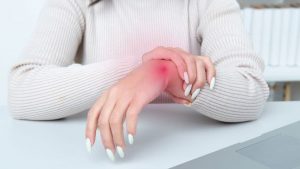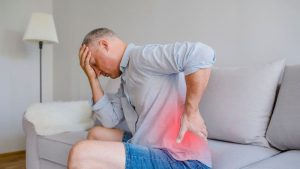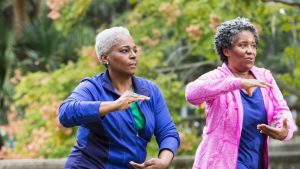Getting Plenty of Exercise Helps Relieve Arthritis Pain
Arthritis is a medical condition that commonly affects the joints but can affect other tissues and organs, depending on the type. In some cases, the symptoms are debilitating and make it a challenge for people to go about their daily lives.

As arthritis progresses, it can significantly reduce your ability to move around. The pain management specialists at AllCare Health & Pain know that exercise is crucial to reducing your pain. We don’t prescribe running a marathon or training for the Olympics, but rather moderate exercise that can improve your pain level in at least five ways.
The Jersey City arthritis pain treatment specialists at AllCare Health & Pain can help identify the benefits and types of exercise that work well with your diagnosis. Call our office at 201-386-9800 today to schedule your first appointment and learn how our pain management specialists can help manage or alleviate your symptoms.
Common Types of Arthritis
There are over 100 types of arthritis. The term “arthritis” refers to health conditions that affect the musculoskeletal system. These are the joints, bones, and muscles in your body. Each type is characterized by different symptoms and has a different prognosis. These are five of the most common types of arthritis.
Osteoarthritis
This form of arthritis affects more people than any other form. You may have heard it referred to as wear-and-tear arthritis as it’s believed to develop from overuse in a specific joint. The potential risk for osteoarthritis increases with age, and the Centers for Disease Control and Prevention believe that over 32.5 million adults in the U.S. are affected by osteoarthritis.
The symptoms often come on gradually and trigger joint pain without the other systemic symptoms that can happen with other types of arthritis. The most common symptoms include:
- Joint soreness and stiffness
- Lack of coordination
- Increasing disability
- Morning joint stiffness
Rheumatoid Arthritis (RA)
This is an autoimmune disease, which means the body’s immune system begins to attack part of the body. These attacks lead to inflammation and severe joint damage. The inflammation and joint damage can become so severe that it changes the structure and function of the joints.
The exact cause of the disease is not known. RA can damage the joint system but can also affect other organs, such as the heart and lungs. Symptoms may begin suddenly or slowly and may vary from person to person and across time. Symptoms include:
- Pain and stiffness, especially in the morning
- Swelling over the joints, with decreased movement
- Pain worsens with joint movement
- Trouble grasping or pinching things
- Occasional fever
- Fatigue
- Lumps, known as rheumatoid nodules
Spondyloarthropathies
 Ankylosing spondylitis (AS) and other similar forms of arthritis are immune conditions that affect the tendons and ligaments. AS is known to attack the spine and pelvis but may also be found in other joints in the body. AS is hereditary and people with the HLA-B27 gene are more likely to develop a form of spondyloarthritis. These can include:
Ankylosing spondylitis (AS) and other similar forms of arthritis are immune conditions that affect the tendons and ligaments. AS is known to attack the spine and pelvis but may also be found in other joints in the body. AS is hereditary and people with the HLA-B27 gene are more likely to develop a form of spondyloarthritis. These can include:
- Psoriatic arthritis
- Acute anterior uveitis
- Reactive arthritis
- Juvenile ankylosing spondylitis
- Enteropathic arthropathy
Fibromyalgia
This condition is classified as arthritis as it causes widespread pain, fatigue, sleep problems, and often emotional and mental distress. Individuals with fibromyalgia may have abnormal pain perception. This means that they may be more sensitive to pain stimuli than people who do not have fibromyalgia.
Other symptoms can include problems with thinking, memory, and concentration, headaches, and pain in the face or jaw. Individuals with fibromyalgia may also complain of digestive issues such as constipation, bloating, and irritable bowel syndrome. However, it is important, despite symptoms, to stick to a regular exercise routine.
Gout
This condition is caused by uric acid crystal build-up in the blood, which causes inflammation, usually in the feet. Gout is triggered by an unhealthy diet and metabolic disorders and can be treated with improvements to the diet. However, the joint damage must be treated separately. A person may experience periods of remission and flare-ups.
Five Ways Exercise Helps Your Arthritis Pain
Arthritis pain nearly always causes adults to slow down and limit their activity. Yet, not exercising can result in more joint damage and greater pain. It’s a vicious cycle. When you suffer from joint pain, exercise may be the last thing you want to do. But it can help maintain your function and reduce your pain and fatigue. An exercise program designed by pain specialists at AllCare Health & Pain will keep these goals in mind.

- Range of motion: The range of motion in your joint is how far your joint can move without pain. Our specialists can help design a program that includes range of motion exercises that you can do any time of the day. They are helpful for your body even when you may have joint pain if they are done gently.
- Strength: Resistance training and strength training are two of the most important ways of stabilizing your joints, improving the strength of the muscles that support your joints, and reducing your pain. You don’t need fancy equipment. In fact, you can use your own body weight to build muscle.
- Endurance: Cardiovascular and aerobic exercises can help strengthen your heart and lungs. This helps improve your endurance and your overall health. Any aerobic exercise you choose should not jar your joints or be high-impact activities. During a flare-up of symptoms, it’s safe to wait until the pain subsides before going back to endurance exercises.
- Balance: As you age, it is important to reduce the risk of falls. Balance exercises can also help strengthen the muscles around your joints and lower your pain. Simple yoga and Tai Chi exercises are good for balance.
- Psychological health: There is a growing body of evidence that shows people who have arthritis also have a higher risk of depression and anxiety. Research also shows that exercise can help lower that risk. People who regularly exercise report improvements in their mood and well-being, which in turn improves pain tolerance.

Contact AllCare Health & Pain Today for Help with Pain Relief
If you experience joint pain and have not found relief with other treatments, contact AllCare Health & Pain immediately to schedule an appointment. We will evaluate your condition and determine a treatment plan that can help alleviate your symptoms.
We use a multidisciplinary approach to address the complex issue of arthritis. Instead of prescribing one or two methods for pain relief, you will find our treatment plans use a multi-pronged approach to increase the potential for success for all of our clients. Let our team show you how treatment with multiple modalities can improve the quality of your life. Call us today at 201-386-9800 to schedule an appointment.

